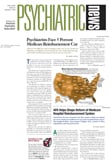Psychiatric researchers have found that cholinergic medications further improve attention deficit/hyperactivity disorder (ADHD) symptoms and executive functioning in children treated with stimulants for the ADHD symptoms.
The results of several pilot studies on ADHD and deficits in executive functioning were reported at the American Academy of Child and Adolescent Psychiatry meeting in Miami last month.
Ritalin Has Limitations
Methylphenidate (Ritalin) is the most commonly used stimulant for ADHD. However, it appears to be less effective in treating mild inattention than severe inattention and selective tasks related to executive functioning, according to researchers from the Hospital for Sick Children in Toronto.
For example, children treated with the stimulant improved on certain visual tasks involving memory, storage, and speed of executing a response, but not in blocking out competing stimuli, planning, and recognition memory.
The findings highlight the need for adjunctive or alternative medication, according to the researchers.
Meanwhile, researchers from Massachusetts General Hospital in Boston reported on the results of two studies at the AACAP meeting involving cholinergic agents.
Both galantamine (Reminyl) and donepezil (Aricept) are used to treat cognitive deficits associated with dementias, Alzheimer’s disease, and psychiatric disorders including schizophrenia and autism. Studies have shown that these drugs are effective in improving cognition, memory, and functional abilities, according to Timothy Wilens, M.D., an associate professor of psychiatry at Harvard Medical School.
He told Psychiatric News, “Galantamine directly stimulates nicotinic receptors,” and this stimulation appears to be “essential in improving aspects of cognition relative to executive functioning, including planning, time-management, and organizational skills.”
Wilens conducted a retrospective chart review of 13 children and adolescents who were treated mainly with methylphenidate followed by antidepressants and antihypertensives.
“All children had been treated with other medications but didn’t adequately respond or couldn’t tolerate the medications,” said Wilens. The mean number of previous medication trials was three.
The mean age of the subjects in the case series was 10, and the mean dosage of galantamine was 14 mg twice a day for at least one week.
The children were followed for an average of 15 weeks, according to Wilens. No one dropped out because of side effects, which included sleep disturbance, agitation, and gastrointestinal disturbances.
Galantamine was effective in improving ADHD symptoms and executive-function deficits by about 23 percent. The effect was statistically significant on ADHD and executive-function measures.
More Investigation Called For
“The limitations of this study include the use of other concurrent medications, its retrospective nature, and limited outcome measures,” said Wilens.
“It remains to be determined whether monotherapy with galantamine will be effective in ADHD and/or executive-function deficits,” he said.
Donepezil produced similar improvements in 12 children with residual ADHD and executive-function deficits, but the effect wasn’t statistically significant, according to James Waxmonsky, M.D., a research fellow in psychiatry at Massachusetts General Hospital.
Wilens plans to investigate further the mechanism of action involving nicotinic receptors. ▪
